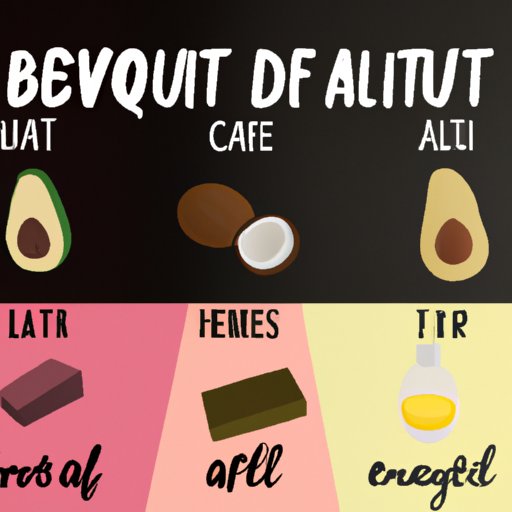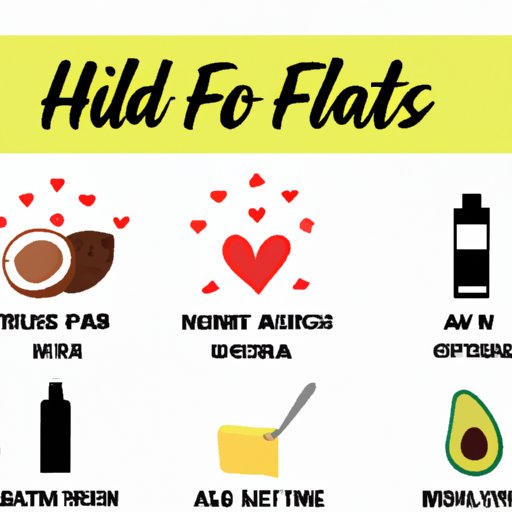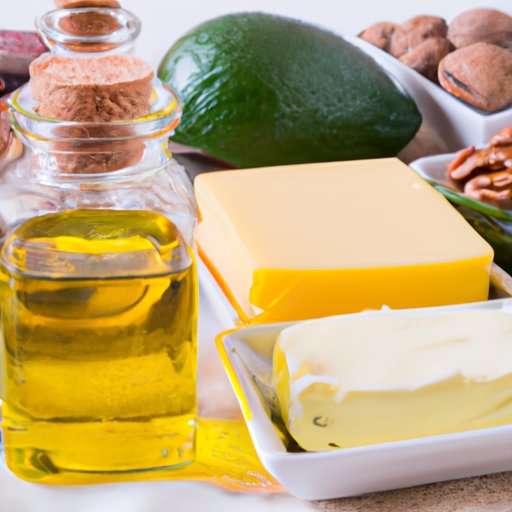Introduction
When it comes to nutrition, fat often gets a bad reputation. But not all fats are created equal – some are actually good for you! Healthy fats, also known as “good” fats, are an essential part of a balanced diet and provide numerous health benefits. In this article, we will explore what healthy fats are and why they are beneficial for your overall health.

Exploring the Different Types of Healthy Fats
There are four main types of healthy fats: monounsaturated fats, polyunsaturated fats, omega-3 fats, and saturated fats. Each type of fat has its own unique nutritional profile and health benefits.
Monounsaturated Fats
Monounsaturated fats are found in foods such as avocados, nuts, and olive oil. They are known to help lower cholesterol levels and reduce the risk of heart disease. Studies have also shown that monounsaturated fats can help improve insulin sensitivity, which helps to control blood sugar levels.
Polyunsaturated Fats
Polyunsaturated fats are found in foods such as fatty fish, walnuts, and sunflower seeds. They are known to help reduce inflammation and lower the risk of heart disease. They also help to increase HDL (“good”) cholesterol levels and reduce LDL (“bad”) cholesterol levels.
Omega-3 Fats
Omega-3 fats are found in foods such as salmon, flaxseed, and chia seeds. They are known to be anti-inflammatory and help to reduce the risk of heart disease, stroke, and other chronic diseases. Omega-3 fats are also known to improve brain health and help to regulate mood and behavior.
Saturated Fats
Saturated fats are found in foods such as butter, red meat, and coconut oil. While they have been demonized in the past, recent studies have shown that saturated fats may actually have some health benefits. For example, they can help to increase HDL (“good”) cholesterol levels and reduce the risk of heart disease. However, it is important to note that these fats should still be consumed in moderation.
How to Incorporate Healthy Fats into Your Diet
Incorporating healthy fats into your diet is simple. Here are a few tips to get you started:
Incorporating Healthy Fats in Your Cooking
Healthy fats can be easily incorporated into your cooking. Try using olive oil instead of butter when sautéing vegetables or baking. You can also add nuts and seeds to salads, oatmeal, or yogurt. Avocado makes a great addition to smoothies or sandwiches.
Including Healthy Fats in Your Snacks
Snacking on healthy fats is a great way to keep you feeling full and energized throughout the day. Try snacking on nuts, seeds, olives, or hummus with whole grain crackers. You can also make your own trail mix with nuts and dried fruit for a nutritious and delicious snack.
Making Healthy Fats Part of Your Meals
Adding healthy fats to your meals is a great way to get more nutrition while also making your meals more satisfying. Try adding nuts or seeds to your salads or stir-fries, or using olive oil as a dressing. Adding avocado to your sandwich or wrap is also a great way to get healthy fats into your meals.

A Guide to Choosing the Best Sources of Healthy Fats
When choosing sources of healthy fats, opt for unprocessed, natural sources. Here are some of the best sources of healthy fats:
Nuts and Seeds
Nuts and seeds are packed with healthy fats, protein, and fiber. They are also a great source of vitamins, minerals, and antioxidants. Try adding a handful of your favorite nuts or seeds to your meals or snacks for an added boost of nutrition.
Avocado
Avocado is a great source of monounsaturated fats, fiber, and potassium. It is also a great addition to salads, sandwiches, or smoothies. Try topping your favorite dishes with slices of avocado for an added boost of flavor and nutrition.
Olive Oil
Olive oil is a great source of monounsaturated fats and antioxidants. It is also a healthier alternative to butter or other processed oils. Try using olive oil instead of butter when cooking or baking.
Fatty Fish
Fatty fish such as salmon and tuna are rich in omega-3 fatty acids. They are also a great source of protein and other essential nutrients. Try incorporating fatty fish into your diet at least twice a week for optimal health benefits.
Coconut Oil
Coconut oil is a great source of saturated fats and medium-chain triglycerides. It has been linked to improved brain and heart health. Try using it as a substitute for butter or other oils when cooking or baking.

The Role of Healthy Fats in Weight Loss and Maintenance
Including healthy fats in your diet can help with weight loss and maintenance. Here’s how:
The Role of Healthy Fats in Appetite Control
Studies have shown that including healthy fats in your diet can help to control hunger and cravings. This is because healthy fats take longer to digest, which keeps you feeling full for longer. As a result, you are less likely to overeat or snack on unhealthy foods.
The Impact of Healthy Fats on Metabolism
Including healthy fats in your diet can also help to speed up your metabolism. Studies have shown that consuming healthy fats can help to increase your metabolic rate and burn more calories throughout the day. This can help with weight loss and maintenance.
What are the Healthiest Fats to Include in Your Diet?
When choosing healthy fats, it is important to opt for unprocessed sources. Nuts, seeds, avocados, olive oil, fatty fish, and coconut oil are all great sources of healthy fats. It is also important to avoid trans fats, which are found in processed foods and can have negative health effects.
Conclusion
Healthy fats are an essential part of a balanced diet and provide numerous health benefits. They can help to reduce cholesterol levels, reduce the risk of heart disease, and even aid in weight loss and maintenance. By incorporating healthy fats into your diet, you can ensure that you are getting all of the nutrients you need for optimal health and wellbeing.
(Note: Is this article not meeting your expectations? Do you have knowledge or insights to share? Unlock new opportunities and expand your reach by joining our authors team. Click Registration to join us and share your expertise with our readers.)
